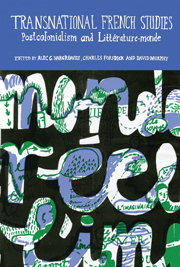Book contents
- Frontmatter
- Contents
- Acknowledgements
- Introduction: What Does Littérature-monde Mean for French, Francophone and Postcolonial Studies?
- From World Literature to Littérature-monde: Genre, History and the Globalization of Literature
- Francophone World Literature (Littérature-monde), Cosmopolitanism and Decadence: ‘Citizen of the World’ without the Citizen?
- From Weltliteratur to World Literature to Littérature-monde: The History of a Controversial Concept
- Littérature-monde in the Marketplace of Ideas: A Theoretical Discussion
- The Postcolonial Manifesto: Partisanship, Criticism and the Performance of Change
- Postcolonialism, Politics and the ‘Becoming-Transnational’ of French Studies
- Mapping Littérature-monde
- Afterword: The ‘World’ in World Literature
- Appendix: Toward a ‘World-Literature’ in French
- Notes on Contributors
Littérature-monde in the Marketplace of Ideas: A Theoretical Discussion
from From World Literature to Littérature-monde: Genre, History and the Globalization of Literature
- Frontmatter
- Contents
- Acknowledgements
- Introduction: What Does Littérature-monde Mean for French, Francophone and Postcolonial Studies?
- From World Literature to Littérature-monde: Genre, History and the Globalization of Literature
- Francophone World Literature (Littérature-monde), Cosmopolitanism and Decadence: ‘Citizen of the World’ without the Citizen?
- From Weltliteratur to World Literature to Littérature-monde: The History of a Controversial Concept
- Littérature-monde in the Marketplace of Ideas: A Theoretical Discussion
- The Postcolonial Manifesto: Partisanship, Criticism and the Performance of Change
- Postcolonialism, Politics and the ‘Becoming-Transnational’ of French Studies
- Mapping Littérature-monde
- Afterword: The ‘World’ in World Literature
- Appendix: Toward a ‘World-Literature’ in French
- Notes on Contributors
Summary
Peut-être l'histoire universelle n'est-elle que l'histoire de quelques métaphores. […] Peut-être l'histoire universelle n'est-elle que l'histoire des diverses intonations de quelques métaphores.
Jacques Derrida, L'Écriture et la différence (1967), 137.Over the past two decades, the constant epistemological renewal that has characterized critical discourse in the humanities has given rise to the concept of the ‘market’ which accords a central role to the notion of globalization. Presented simultaneously as ‘paradigm’, ‘logic’, ‘mechanism’ and ‘rhetoric’, this concept of the market has also shaped a number of discursive and theoretical positions. For example, critics have debated ‘l'invention du marché’ [the invention of the market] (Norel, 2004), the ‘temps du marché’ [era of the market] (Laïdi, 2000: 173), the ‘primat de la rationalité marchande’ [primacy of market rationality] as a form of modern ‘rationalité’ [rationality] (Castillo Durante, 2004: 17) and the ‘procès de marchandisation’ [commodification process] as a ‘monde spectral’ [spectral world] (Fradin, 2005: 206) that haunts the critical discourse of modernity. It is within this context of paradigmatic transformation, linked in turn to various manifestations of globalization, that the relevance and validity of certain contemporary critical concepts require closer examination.
Amongst the modish concepts that have generated debate and often contradictory commentary is that of littérature-monde, which Michel Le Bris introduced in his 1992 edited volume, Pour une littérature voyageuse, and which was then further developed by the forty-four writers who signed the littérature-monde manifesto in Le Monde on 16 March 2007 (hereafter referred to as the Manifesto).
- Type
- Chapter
- Information
- Transnational French StudiesPostcolonialism and Littérature-monde, pp. 49 - 66Publisher: Liverpool University PressPrint publication year: 2010

